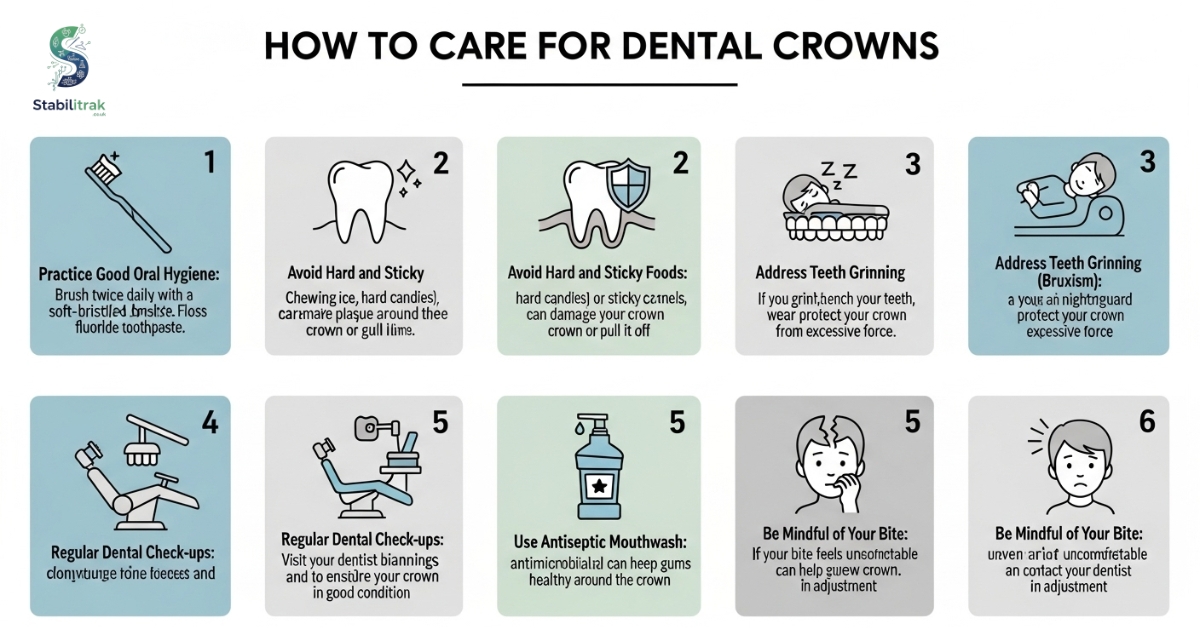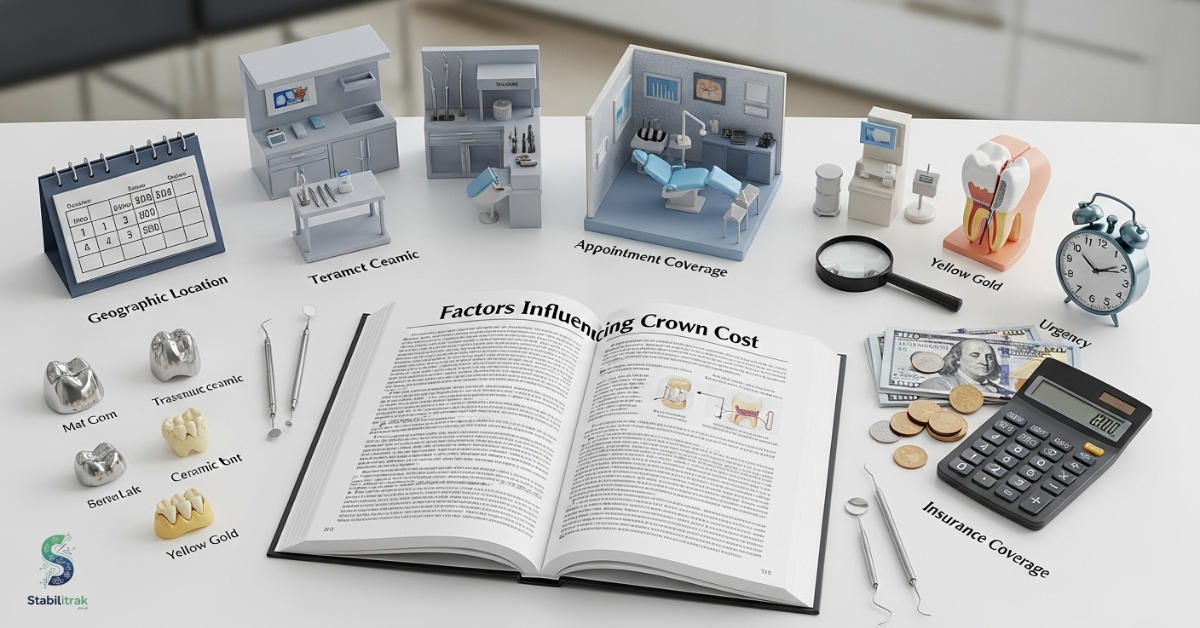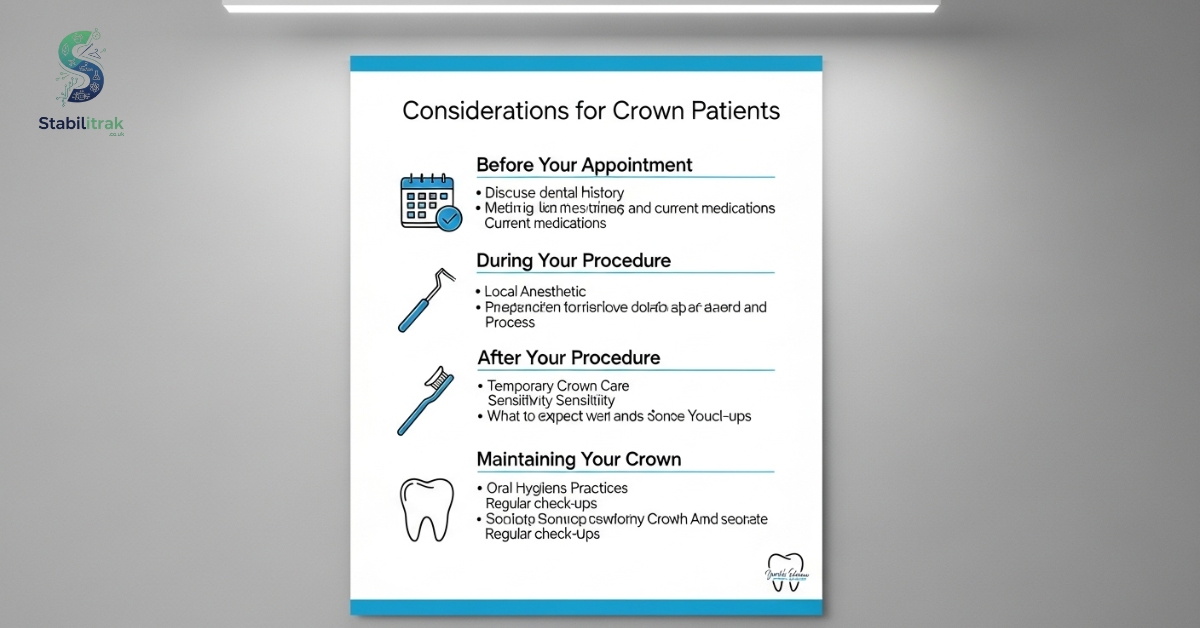Ever had a dentist mention you might need a crown, and the first thought that popped into your head was, “Okay… but what’s the crown cost going to be?” You’re not alone. Dental work can feel overwhelming, and the price tag is often the part that worries people the most. Nobody likes surprises when it comes to bills, especially for something as important as their teeth.
That’s exactly what this post is here to clear up. We’ll walk through what goes into crown cost, the factors that make prices go up or down, and how insurance or payment options can help. By the end, you’ll have a clear idea of what to expect before heading into your appointment, so you can make the best choice for your smile and your budget.
Types of Dental Crowns
Dental crowns, also called tooth caps, come in several materials. Each option has pros and cons depending on appearance, durability, and price.
Porcelain, zirconia, ceramic, metal alloys, and resin are the most common. Some patients choose based on budget, while others focus on cosmetic results or long-term strength.
Porcelain Crowns
Porcelain crowns are popular for front teeth because they look natural. They match the color of your surrounding teeth and are ideal for cosmetic dentistry or smile makeovers.
However, a porcelain crown is typically higher than that of metal or resin options. They’re durable but can chip if you grind your teeth or chew very hard foods.
Zirconia Crowns
Zirconia crowns are extremely strong and often used on molars that do a lot of chewing. They resist wear and hold up well over time.
The zirconia crown cost is usually mid-to-high range, reflecting the advanced materials and lab technology used. Some dentists even use monolithic zirconia for maximum durability.
Metal Crowns (Gold or Alloy)
Metal crowns, such as gold alloy or base metal, are long-lasting and less likely to chip. They’re often chosen for back teeth where appearance is less of a concern.
The metallic crown cost varies widely. Gold crowns are among the most expensive, while base metal crowns can be more affordable.
Temporary Resin Crowns
Temporary resin crowns are used while you wait for your permanent crown to be made in the dental laboratory. They protect your tooth but aren’t meant for long-term use.
Temporary crown cost is usually lower, but since they’re short-term, they don’t provide the same durability as porcelain or zirconia.
Common Uses of Dental Crowns
Dentists recommend crowns for several reasons. A cracked or chipped tooth may need protection, and a crown can restore both function and appearance.
Crowns are also used after root canal treatment, for covering large fillings, or as part of a dental bridge or implant crown.
The Procedure for Getting Dental Crowns
Getting a crown typically takes two visits. During the first, your dentist prepares the tooth and takes impressions. At the second visit, your permanent crown is cemented.
In some offices, same-day crowns are available using CAD/CAM technology, but most patients will wear a temporary crown for a couple of weeks before receiving the final one.
Examination and Cleaning
The process begins with an exam. Your dentist may order X-rays or even a cone-beam CT scan if the case is complex. Cleaning and shaping the tooth is the first physical step.
This ensures the crown will fit properly and helps reduce the risk of decay under the restoration.
Tooth Impression
An impression or digital scan is then taken. This creates a model for the dental laboratory to build your custom crown.
Diagnostic casts or digital designs ensure accuracy and comfort once the crown is placed.
Temporary Crown
A temporary crown is placed to protect your tooth while the permanent version is being made. It allows you to chew and smile without discomfort.
Temporary crowns are usually made from acrylic or resin and are secured with temporary cement.
Permanent Crown Placement
Once your crown is ready, the dentist checks the fit, color, and bite. If everything is correct, the crown is cemented permanently.
This step completes your restorative treatment, giving you both function and aesthetics.
Read More Article: What Not to Eat After Teeth Cleaning
How to Care for Dental Crowns

Caring for your crown properly helps extend its lifespan. On average, crowns last 5–15 years, but with excellent oral hygiene, some last 25 to 30 years.
Your daily habits and follow-up care make all the difference in crown durability.
Brush and Floss Regularly
Keep the gum line clean to prevent decay under the crown. Floss carefully around the crown, especially if you have multiple restorations.
A soft-bristle brush and fluoride toothpaste are recommended for crown maintenance.
Avoid Hard and Sticky Foods
Chewing on ice, hard candy, or sticky caramel can crack or loosen crowns. Be mindful of protecting your investment.
If you’ve had a porcelain crown, be extra cautious with foods that might chip the surface.
Use a Nightguard if Necessary
If you grind your teeth at night (bruxism), ask your dentist about a nightguard. Grinding can wear down or break a crown over time.
This simple preventive step can add years to your crown’s lifespan.
Attend Regular Dental Checkups
Routine exams and professional cleanings help your dentist monitor your crown’s condition. Small problems can be fixed before they turn into costly replacements.
Prevention is always cheaper than repair, especially with dental restorations.
Avoid Using Teeth as Tools
Opening bottles or tearing packages with your teeth is a quick way to damage a crown. Always use the right tool instead.
This habit also protects your natural teeth from unnecessary chips or cracks.
Factors Influencing the Cost

Several factors affect the final price of a crown. Understanding them helps you budget and make informed choices.
Location, dentist expertise, case complexity, and additional services all play a role in crown cost.
Material of the Crown
Porcelain, zirconia, ceramic, resin, and metal all have different price ranges. Porcelain fused to metal is often a mid-range option, while gold crowns are premium-priced.
Your choice depends on durability needs, cosmetic goals, and your budget.
Location of the Dental Clinic
Dental costs vary by region. For example, the cost of a crown in Ellicott City, MD, is often higher than in rural areas due to overhead and cost of living.
National averages show wide differences in crown cost by state.
The Expertise of the Dentist
Specialists such as prosthodontists may charge more, but their skill can provide better long-term results.
Paying more up front for expertise may save money on repairs or replacements later.
The Complexity of the Case
A simple crown for a chipped tooth is less costly than one after root canal therapy. If extra build-up, posts, or surgical steps are required, the price increases.
Complex cases often involve diagnostic scans, more lab work, and multiple visits.
Diagnostic and Laboratory Costs
X-rays, impressions, and cone-beam CT scans add to the bill. The dental laboratory fee for making your custom crown is a major part of the overall cost.
These behind-the-scenes steps are essential for proper fit and function.
Number of Crowns Needed
One crown is manageable, but if you need several at once, the costs add up quickly. Dentists sometimes offer bundled pricing for multiple crowns.
Dental bridges, which use crowns as anchors, can also raise the overall price.
Insurance Coverage
Most dental insurance plans cover about 50% of a medically necessary crown. However, cosmetic crowns are usually not covered.
Annual coverage caps (often $1,000 to $2,500) may still leave you with significant out-of-pocket expenses.
Additional Services
Root canals, extractions, or gum contouring may be required before crown placement. Each of these adds to the overall crown cost.
Always ask for a detailed treatment plan so you know what’s included and what’s extra.
Considerations for Patients

When thinking about getting a crown, don’t just look at price. Factor in the dentist’s experience, the type of crown, and your long-term oral health.
Remember, a cheaper option may need replacement sooner, while a more expensive one could last decades.
All Summed Up!
The truth is, there isn’t a single answer to “how much does a crown cost.” Prices vary from $500 on the low end to $2,500 or more in the U.S., depending on materials and circumstances.
Knowing the details behind crown cost helps you make smart decisions for your health, budget, and peace of mind.
FAQs About Tooth Crown Cost
Tooth crown cost with insurance
With dental insurance, most plans cover about 40 to 60% of the cost of a crown if it’s medically necessary. Your out-of-pocket cost usually depends on the type of crown and your plan’s annual maximum.
How much does a crown cost with Delta Dental?
Delta Dental typically covers part of the cost, but exact coverage depends on your policy. On average, you might pay between $400 and $900 after insurance. Always check your plan details to confirm.
Tooth crown cost without insurance
Without insurance, the cost of a crown usually ranges from $800 to $2,500 in the U.S., depending on the material used and where you live. Porcelain and gold crowns are usually at the higher end.
Aspen Dental crown cost
At Aspen Dental, prices vary by office; however, many patients report crown costs ranging from $1,000 to $2,000 per tooth. Financing plans are often available to spread out payments over time.
How much does a crown cost, Reddit
According to discussions on Reddit, people share paying anywhere from $600 to $1,600 for a crown in the U.S. Experiences vary widely by location and insurance coverage.
How much does a crown cost after a root canal?
After a root canal, the tooth almost always needs a crown. Adding the root canal fee (around $700 to $1,500) plus the crown ($800 to $2,500), the total cost may reach $1,500 to $4,000.
Front tooth crown cost
Crowns for front teeth are often porcelain or ceramic for a natural look. They usually cost between $900 and $2,500, depending on the material and cosmetic work needed.
How much does it cost to put a crown back on a tooth?
If your crown comes off but is still in good shape, re-cementing it may cost $75–$300. If it’s damaged, a replacement crown will be required at full price.
What is the normal cost of a tooth crown?
On average, a standard tooth crown in the U.S. costs around $1,000–$1,500. The final price depends on the crown material, the dentist’s expertise, and any extra procedures.
Are crowns covered by insurance?
Most dental insurance plans cover crowns if they are medically necessary, not just cosmetic. Coverage is usually about 50%, but you’ll need to check your policy for annual limits.
What if I can’t afford a crown?
If cost is a concern, ask your dentist about payment plans, discount programs, or dental schools that provide treatment at lower fees. Waiting too long may make the problem worse and more expensive.
Is it cheaper to pull a tooth or get a crown?
Pulling a tooth is usually cheaper upfront. However, replacing a missing tooth with an implant or bridge later is often more expensive than getting a crown in the first place.







2 thoughts on “How Much Does a Tooth Crown Cost? Average Prices, Insurance, and What to Expect”